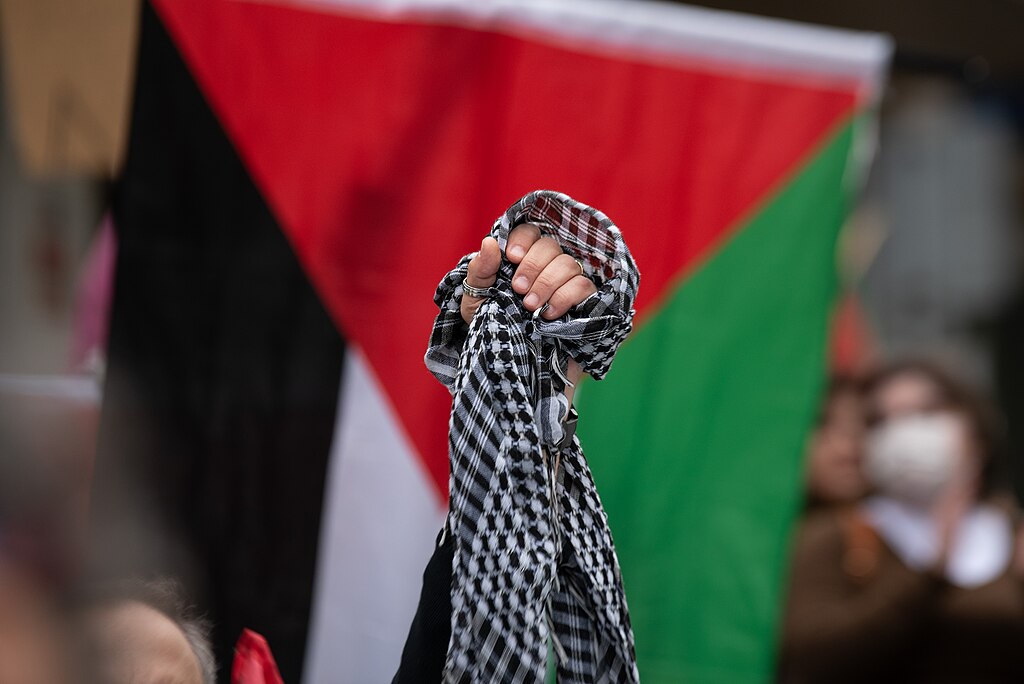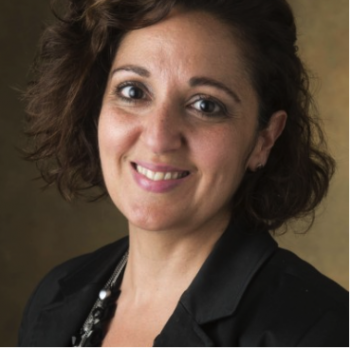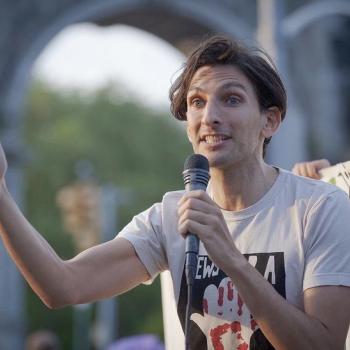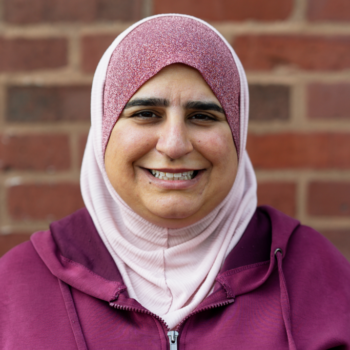Gaza is Palestine, from Sandra Tamari
Gaza isn’t just a mere strip of land; Gaza is Palestine. It is a vital part of my homeland, unjustly transformed into a colonial prison by Israel to cordon off native Palestinians to maintain a Jewish majority. This manufactured majority offers a liberal, democratic facade to settler colonialism. About 80% of Palestinians in Gaza are refugees, driven from their homes by Israeli forces in 1948 during a period Palestinians call the Nakba, or catastrophe. Palestinians could climb to the roofs of their homes in the Gaza Strip and look out onto the land their grandparents were forced from, where Israeli settlers lived idyllic lives until October 7.
In 1967, Israel occupied the Gaza Strip and controlled the besieged enclave with a brutal military rule. In 2005, Israel pulled its settlers out of Gaza and imposed a partial blockade on the Strip that became a full blockade and siege after Hamas came to power in Gaza in 2007. For the past 16 years, the Palestinians of Gaza have endured this Israeli siege that prevented exit and entry from the Strip and limited the amount of medicine, building supplies, and fuel allowed to enter. Israeli authorities prepared a document in 2008 outlining the minimum required calorie intake for Palestinians to prevent malnutrition. This information was used to regulate the quantity of food permitted into Gaza without reaching the point of causing severe starvation.
Today, Israel claims self-defense for its war on Gaza, but the reality is stark: over 28,000 Palestinians, one in every 100 in Gaza, have been killed. Millions are displaced from their homes again. This isn’t self-defense; it’s the consequence of Zionism. Zionism, a political movement that began in the late 1800s by Jews in Europe to establish a Jewish nation-state, aims to colonize all of Palestine. To maintain a Jewish majority in a land already inhabited requires constant elimination of the native. Zionists, like other European colonizers, believed they were a civilizing force; Palestinians either didn’t exist or were not worthy of the land. They were and are backed by Christian ideas of the “Holy Land” and a Jewish return to it as part of Biblical prophecy.
Palestinians say the Nakba never ended. The current genocide in Gaza surpasses the toll of the Palestinian catastrophe of 1948, events that led to the death of the paternal grandfathers of both my husband and me. That trauma hasn’t ended yet 75 years later and the pain of this current moment will haunt the world for generations to come. Palestinians have resisted Zionism for over a century and will continue to resist until they are free from colonial oppression. To oppose Zionism is to reject the erasure of Palestinians from their land.
As Zionism becomes indefensible to a wider margin of the American people, we will hear appeals from American moderates, deeply vested in Zionism’s liberal façade, imploring us to avoid taking sides. But we can’t be neutral: we either condemn the killing of civilians, the destruction of their homes, and the state-facilitated starvation impacting 2.3 million Palestinians, or we support it. Which side are you on?
Dismantle Zionism, from Morgan Bassichis
I was first politicized in the movement to abolish prisons and police. Years of working with LGBTQ+ people in prisons, coming out of jail, navigating abusive relationships, and reeling from police assault, showed me what abolitionists, Black activists, and women of color feminists have been saying for generations: that the state itself is the central perpetrator of violence. That real safety comes not from more cops or more prisons, but from having enough food to eat, a quality place to live, access to culturally competent healthcare and education, and loving friends and family. That we can chip away at a death-dealing carceral culture and build up a life-affirming one in its place.
I also learned from these movements that these systems, and our movements, are global and that there is no liberation without Palestinian liberation. “None of us are free until all of us are free,” I heard. I met anti-Zionist Jews and anti-racist white people who didn’t just want to be the “good” Jew or the “good” white person who knew better than everyone else, but wanted to organize their communities away from white supremacy and into multiracial movements for justice.
While a participant in the Anne Braden Anti-Racist Training Program in 2008, my queer Jewish friend Becca asked me to take part in my first Palestine solidarity action. I remember thinking, “I don’t know enough.” But Becca reassured me that I could trust in my heart and my gut that knew it was wrong for Israeli bulldozers to destroy Palestinian homes and settlers to burn centuries-old olive trees. I joined Becca in disrupting the San Francisco Jewish Community Center’s 60th-anniversary celebration of the founding of the state of Israel –– what Palestinians commemorate as the Nakba –– the ethnic cleansing of over 750,000 Palestinians from their homeland and the destruction of over 500 Palestinian villages and towns. As we raised our voices as anti-Zionist Jews to scream, “No time for celebration,” I felt my life transform.
Through collective action I found a community of Jews who believed in justice for all people. Who locked arms with Arab, Muslim, Palestinian, immigrant, Black, indigenous, queer, feminist, disabled activists imagining a world in which no one is disposable, in which everyone is free. I found Jewish Voice for Peace. I learned from our movement elders, mostly lesbian and feminist Jews, who have been saying “not in our name” and “never again for anyone” for generations, when it was much lonelier to do so. Real solidarity, I learned, meant rejecting all ideologies of supremacy, including Zionism.
We reject Zionism because we believe in collective liberation. We reject Zionism because we do not want to be cast in the role of colonizer or complicit bystander. We reject Zionism because our ancestors who survived fascism and genocide and ethnic cleansing taught us to recognize those threats to humanity when we see them. We reject Zionism because our safety, our dignity, and our wholeness as Jews can only come through solidarity with all oppressed people everywhere.
Palestine Will Free Us All, from Ramah Kudaimi
Palestine is central to liberation across the globe –– just look at the millions of people who have taken to the streets every week since Israel’s bombardment of Gaza started. It isn’t only about people showing solidarity with the Palestinian people, it is also an understanding that struggles and movements are interconnected across borders.
The start of this year marked 13 years since the people of Tunisia ousted Zine El Abidine Ben Ali from power, ending his 24-year dictatorship. The Jasmine Revolution inspired uprisings across the region as people took to the streets and occupied public spaces in Bahrain, Egypt, Libya, Syria, Yemen, and beyond. The demand was simple: The people want the fall of the regime. Hosni Mubarak was forced to step down after a 30-year rule. Muammar Gaddafi was killed after launching a war to save his own 34-year regime. Ali Abdullah Saleh resigned after 22 years in power. Over the years, protests also happened in Iraq, Iran, and Sudan.
Looking at the region today, it is difficult to remember the hope of 2011/2012. Dictatorships are still the norm. People across the region are still impacted by authoritarianism, militarism, counter-revolutionary forces, and imperialism, whether by the US, Russia, and/or China. And Israel continues its 75+ year ethnic cleansing of Palestine, with the current genocide in Gaza being the latest iteration of the Zionist project.
Revolutions, resistance, and uprisings feed off one another. Occupy Wall Street was inspired by the occupation of Tahrir Square. It isn’t a coincidence that the revolts against the Arab regimes followed years of people watching images of Palestinians rising up during the 2000s intifada, as well as witnessing the destruction of Afghanistan and Iraq by the United States. Palestinians have adopted the revolutionary songs of Syrians; Syrians have painted murals of George Floyd in Idlib; Black and brown people in the US have asserted Palestine is a racial justice issue.
Back in October, the first marches on Cairo’s Tahrir Square happened since the 2014 coup that brought the current dictator Abdel Fattah El- Sisi to power. People protesting against Israel’s massacres have been learning about the histories of other oppressed people, from Haiti to the Congo to Yemen. Ukrainians released a letter of solidarity with the Palestinian people.
I share all these examples to help us push our imaginations about what’s possible in this moment. States work together to oppress the people. The War on Terror framing has been used by India against Kashmir, by China against the Uyghur people, by Turkey against the Kurdish people, by Saudi Arabia, by Iran. Israel and Russia test out new weapons against Palestinians and Syrians, respectively, that they then sell to others. Corporations, banks, and other financial actors are happy to help develop the weapons and tools of surveillance to help these states in order to profit from murder, prisons, and torture.
The only way we can defeat all this is for us to uplift one another across struggles and borders, to learn from one another’s histories, to refuse to play oppression olympics. While we must bring about a ceasefire immediately, it is also very much the time we all commit to Palestinian liberation. It is what’s needed to free us all.
Reading list:
“Zionism from the Standpoint of Its Victims”, Edward Said, 1979
Palestine: A Socialist Introduction, Edited by Sumaya Awad and Brian Bean, 2020
Hamas Contained: The Rise and Pacification of Palestinian Resistance by Tareq Baconi, 2018.
Pappe, Ilan. Ten myths about Israel. Verso Books, 2017
Light in Gaza: Writings Born of Fire edited by Jehad Abusalim, Jennifer Bing, Michael Lotz, and American Friends Service Committee
The Hundred Years’ War on Palestine: A History of Settler Colonialism and Resistance, 1917–2017, Author: Rashid Khalidi 2020
Questions to Ask Before Your Bat Mitzvah
Demanding Dignity: Young Voices from the Front Lines of the Arab Revolutions by Maytha Alhassen (Editor), Ahmed Shihab-Eldin (Editor), 2012



